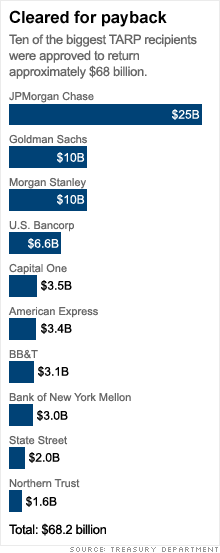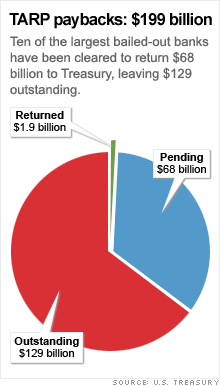TARP: End of an error
Ten big (and mostly healthy) banks are finally being allowed to pay taxpayers back $68 billion in TARP funds. Can I get a Hallelujah?



NEW YORK (CNNMoney.com) -- Good riddance, TARP. It was nice knowing you.
Okay, the Treasury Department's controversial Troubled Asset Relief Program isn't exactly dead yet. But by finally letting 10 of the nation's largest financial firms return bailout funds, the Treasury is undoing one of the worst aspects of TARP.
Several of the banks that received money in the panic last fall didn't really need it.
But by all accounts, then Treasury Secretary Hank Paulson and Federal Reserve chairman Ben Bernanke did their best to convince some of the nation's healthier banks, including JPMorgan Chase (JPM, Fortune 500) and Bank of New York Mellon (BK, Fortune 500), to take one for the team.
Some banks didn't want to be viewed by investors as "troubled" enough to qualify for something called the Troubled Asset Relief Program.
But Paulson and others in Washington were apparently concerned that if TARP was only given to banks truly in dire need, the markets would freak out and punish those banks severely. (Coffee's for closers, TARP's for losers.)
That backfired big time. Instead of penalizing only the weak banks, such as Citigroup (C, Fortune 500) and Bank of America (BAC, Fortune 500), investors dumped shares of all banks.
Wall Street quickly came to the wrong conclusion that the entire banking system was on the verge of being insolvent. Short sellers sold bank stocks first and asked questions later.
Talkback: Was it a good idea to let big banks repay TARP funds? Leave your comments at the bottom of this story.
Don't get me wrong, I maintained back in September (and took a lot of flack for it from readers) and still believe now that helping the financial system was the right thing to do.
The crisis in confidence that came about in Lehman's wake was threatening to do more than just freeze the credit markets temporarily; it was as if someone was pouring liquid nitrogen on the markets to cryopreserve them.
But the execution was all wrong. Instead of turning TARP into a second coming of the Resolution Trust Corp, which the government set up in the late 1980s to liquidate the festering real estate assets of failing savings and loans, TARP became a blank check bailout.
Treasury gave up on the notion that it could rid banks of toxic assets with the $700 billion approved by Congress. It decided instead to pressure banks into taking TARP money under the illusion that they would then use this money to make more loans to consumers and businesses. Credit crisis solved!
That didn't happen. Making matters worse, other banks that were not part of the first round of TARP injections felt they had to bend over and get inoculated with a shot of TARP to show the government they were doing their part -- regardless of whether they were sick.
Until today, this pattern didn't really change all that much once the Obama administration took over and Tim Geithner succeeded Paulson.
And once a bank took TARP funds, their spending patterns became heavily scrutinized by both politicians and the mainstream media. Consider the case of Chicago bank Northern Trust.
Celebrity gossip site TMZ.com (not exactly a destination for financial news) broke the story back in February that Northern Trust (NTRS, Fortune 500), which received $1.6 billion in TARP funds, was sponsoring a golf tournament and holding lavish parties to wine and dine its clients. (TMZ is a subsidiary of AOL, which for the time being, is still owned by CNNMoney.com parent Time Warner.)
A media and political backlash immediately ensued and Northern Trust quickly pledged to pay back its TARP funds as soon as prudently possible. So it's no surprise that Northern Trust was in fact one of the 10 banks approved Tuesday to redeem the government's preferred shares.
Northern Trust is the perfect example of TARP's failings.
For one, the bank is not really a consumer lender. It is mainly a wealth management firm for the affluent. So giving it TARP money wasn't going to allow you and me to get a more affordable mortgage or car loan.
Second, Northern Trust wasn't suffering as a result of the credit crisis. The company continued to post healthy profits and its stock was performing reasonably well. So there was no need to bail it out.
Finally, even though Northern Trust's management team suffered from a terrible case of tin ear by not realizing its spending would come under fire, the bank should never have been put in the position to be criticized in the first place.
If Northern Trust didn't take taxpayer money, nobody would have cared that the bank shelled out big bucks to rent out the House of Blues in West Hollywood and serve guests seared salmon and petite angus filet.
It would just be another example of a bank that may or may not have been spending too much in the name of "customer retention." And it would have been a question for only that company's board and shareholders to consider, not blowhards in Congress and the entire taxpaying public.
Now it is my sincerest hope that Northern Trust and other leading financial firms that will soon find themselves freed from the shackles of TARP, such as JPMorgan Chase, American Express (AXP, Fortune 500) and Goldman Sachs (GS, Fortune 500), don't use their newfound freedom to return to the ways of obscene spending.
It goes without saying that banks are partly to blame for the credit bubble because they created a culture that not only rewarded but encouraged reckless risk taking in the name of meeting short-term profit targets and satisfying Wall Street.
But make no mistake. It is good news that the government is finally allowing some of the banks that didn't really need a rescue to begin with to stop walking around with a lead-weighed life preserver around their necks to perpetuate the myth that all banks are in the same boat.
Talkback: Was it a good idea to let big banks repay TARP funds? ![]()

